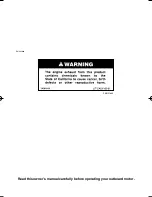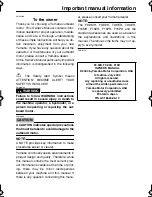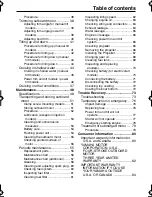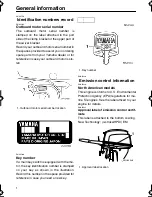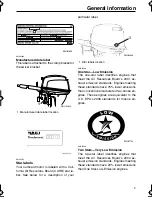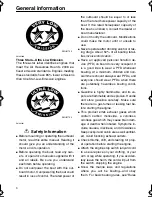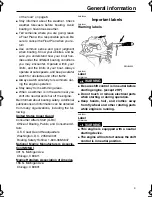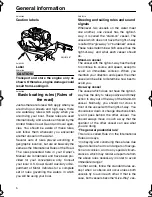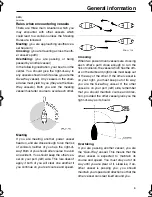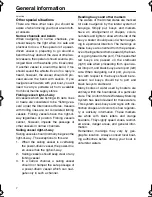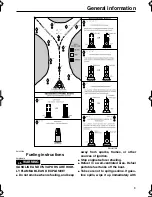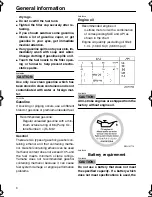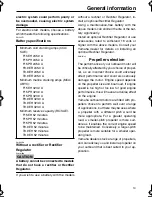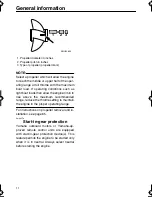
General information
5
EMU25464
Caution labels
EMU25472
Label
CAUTION:
ECM01190
Transport and store the engine only as
shown. Otherwise, engine damage could
result from Leaking oil.
EMU25500
Basic boating rules (Rules of
the road)
Just as there are rules which apply when you
are driving on streets and high ways, there
are waterway rules which apply when you
are driving your boat. These rules are used
internationally, and are also enforced by the
United States Coast Guard and local agen-
cies. You should be aware of these rules,
and follow them whenever you encounter
another vessel on the water.
Several sets of rules prevail according to
geographic location, but are all basically the
same as the International Rules of the Road.
The rules presented here in your Owner’s
Manual are condensed, and have been pro-
vided for your convenience only. Consult
your local U.S. Coast Guard Auxiliary or De-
partment of Motor Vehicles for a complete
set of rules governing the waters in which
you will be using your boat.
EMU25510
Steering and sailing rules and sound
signals
Whenever two vessels on the water meet
one another, one vessel has the right-of-
way; it is called the “stand-on” vessel. The
vessel which does not have the right-of-way
is called the “give-way” or “burdened” vessel.
These rules determine which vessel has the
right-of-way, and what each vessel should
do.
Stand-on vessel
The vessel with the right-of-way has the duty
to continue its course and speed, except to
avoid an immediate collision. When you
maintain your direction and speed, the other
vessel will be able to determine how best to
avoid you.
Give-way vessel
The vessel which does not have the right-of-
way has the duty to take positive and timely
action to stay out of the way of the Stand-On
vessel. Normally, you should not cross in
front of the vessel with the right-of-way. You
should slow down or change directions brief-
ly and pass behind the other vessel. You
should always move in such a way that the
operator of the other vessel can see what
you are doing.
“The general prudential rule”
This rule is called Rule 2 in the International
Rules and says,
“In obeying and construing these rules due
regard shall be had to all dangers of naviga-
tion and collision, and to any special circum-
stances, which may render a departure from
the above rules necessary in order to avoid
immediate danger.”
In other words, follow the standard rules ex-
cept when a collision will occur unless both
vessels try to avoid each other. If that is the
case, both vessels become “Give-Way” ves-
ZMU01987
Содержание F15D
Страница 1: ...F9 92D T9 92D F15D OWNER S MANUAL 66M 28199 1A U S A Edition LIT 18626 06 13 ...
Страница 2: ...EMU25060 ZMU01690 Read this owner s manual carefully before operating your outboard motor ...
Страница 63: ...Maintenance 58 EMU28931 Greasing Yamaha marine grease Water resistant grease F9 9ER T9 9ER F15PR ZMU02330 ...
Страница 64: ...Maintenance 59 F9 9MH T9 9EH F15MH F15EH F15PH ZMU02331 ...
Страница 85: ...80 Consumer information EMU29811 Important warranty information for U S A and Canada ...
Страница 86: ...Consumer information 81 ...
Страница 88: ...Consumer information 83 ...
Страница 89: ...Consumer information 84 EMU29840 IMPORTANT WARRANTY INFORMATION IF YOU USE YOUR YAMAHA OUTSIDE U S A OR CANADA ...
Страница 90: ...Printed in Japan July 2004 0 4 1 Printed on raecycled paper ...
Страница 92: ...PLACE POSTAGE HERE ATTN WARRANTY DEPARTMENT Warranty card 2 27 02 11 47 AM Page 2 ...


